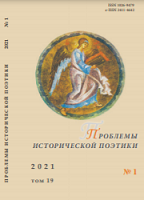Проблема повествования в «Записках из Мертвого Дома» Ф. М. Достоевского
The Problem of Narration in Notes from a Dead House by Fyodor Dostoevsky
Author(s): Tamara BatalovaSubject(s): Studies of Literature, Russian Literature, 19th Century
Published by: Петрозаводский государственный университет
Keywords: Fyodor Dostoevsky; “Notes from a Dead House”; Pavel Medvedev; Christianity; genre; hero; narrator; storyteller;
Summary/Abstract: Within the framework of Pavel Medvedev’s sociological poetics, the article identifies and studies the features of the narrative in Fyodor Dostoevsky’s Notes from a Dead House, and examines the role of these features in expressing the key idea of this novel, namely the desire of convicts for freedom, for “resurrection from the dead”. From this point of view, the author examines the significance of the narrator’s duality (Goryanchikov and Goryanchikov-Dostoevsky) and the juxtaposition of the characters in the narrative (positive and negative). He also analyzes the compositional function of the XI chapter of the first part of Notes from a Dead House, “Presentation”, in the plot. The Christian faith plays the vital role in the expression of the essential idea of the work. An open-minded attitude to people, a friendly, Christian approach towards them is a distinctive feature of Goryanchikov-Dostoevsky and all the positive characters in the book. Inspired by the celebration of the Nativity of Christ, the convicts staged a theatrical performance, which alters the moral state of both the actors and the audience, fortifies their sense of self-esteem required to resist the prison orders that “deaden” people, and strengthens the prisoners’ desire for freedom, for “resurrection from the dead”. The article concludes that Notes from a Dead House is the beginning of aesthetic and artistic changes that manifested themselves in Dostoevsky’s post-prison works.
Journal: Проблемы исторической поэтики
- Issue Year: 19/2021
- Issue No: 1
- Page Range: 221-238
- Page Count: 18
- Language: Russian

